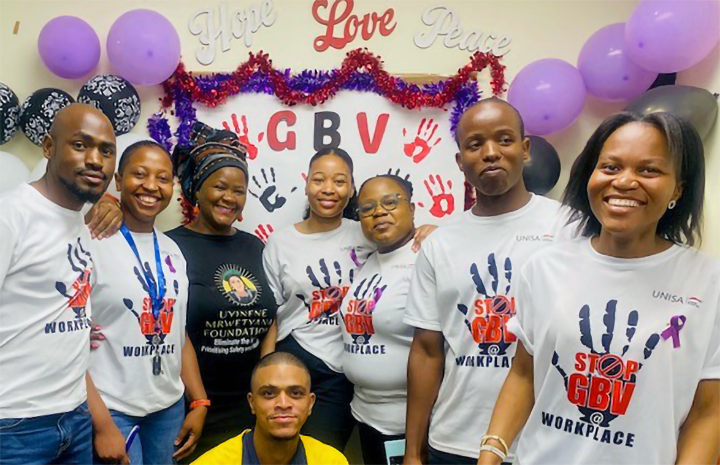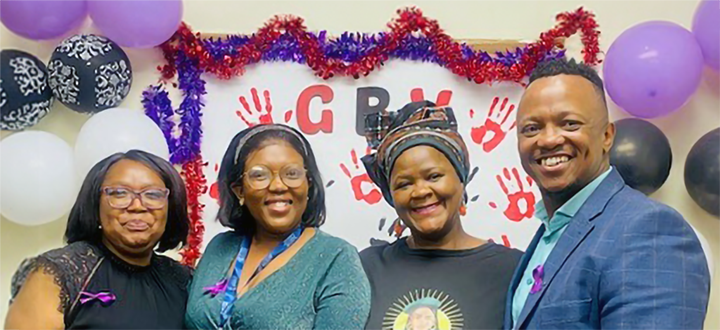News & Events
GBV workshop: A journey of awareness, healing, and empowerment
On 5 December 2024, a transformative workshop dedicated to addressing the serious issue of gender-based violence (GBV), developed by the East London Counselling Office, was hosted in the Eastern Cape. The event brought together experts, survivors, and community leaders to share insights, strategies, and personal experiences. It was an enlightening experience that highlighted the multifaceted nature of GBV and the urgent need for collective action.

Unisa staff who participated in the workshop
The programme opened with a prayer led by Gareth Rodney, a poignant and fitting beginning considering the sensitive nature of the discussions that lied ahead. Following this, the Eastern Cape Regional Director, Motale Nkgoang, welcomed all attendees, including esteemed guests, and outlined the purpose of the workshop. It was a clarion call to confront GBV head-on and provide a platform for education, support, and empowerment.
Hope Fata, a Higher Health counselling psychologist, provided an insightful foundation for the workshop by defining GBV and outlining its various types. She shared disturbing statistics and emphasised the importance of recognising the signs of abuse, equipping attendees with knowledge critical for intervention. Her discussion underscored the pervasive nature of GBV in South Africa and its far-reaching consequences.
Building on this, Dr Lekgowe Thipe, a Unisa Senior Student Counsellor, focused on GBV within LGBTQIA+ communities, highlighting the heightened vulnerabilities faced by these individuals. She revealed how transgender people experience disproportionately higher rates of violence and how lesbian, gay, and bisexual high school students often endure physical and sexual violence at alarming levels. Her presentation shed light on the intersectionality of GBV and the need for inclusive advocacy.
In a thought-provoking session, Dr Joshua Ndlela, a Unisa Student Counsellor, urged attendees to prioritise self-love. He challenged harmful societal norms, particularly the “abantu bazothini” (what will people say) mentality, which often traps individuals in toxic relationships. His words resonated deeply, encouraging participants to value themselves enough to leave situations that no longer serve their well-being.
Lieutenant-Colonel James Louw and Warrant Officer Randall Freeks, from the East London SAPS, highlighted the critical role of law enforcement in combating GBV. They explained the police’s mandate to protect victims, facilitate medical care, and aid with obtaining protection orders. Their practical guidance on navigating the legal system was invaluable for empowering survivors to seek help.
Shifting the focus to prevention, Buhle Mpofu, a social worker with FAMSA, introduced the Mencare 50:50 project. This initiative promotes positive parenting practices as a proactive approach to preventing violence against children. By fostering nurturing family environments, the programme aims to reduce the cycle of violence within communities.
The workshop took an emotional turn as Azola Mrana, a motivational speaker and GBV survivor, bravely shared her personal story of enduring abuse. Her experience of survival and healing, along with other women’s, led her to the establishment of the Brightlight Wellness Foundation, a non-profit organisation dedicated to supporting and empowering survivors. Her story was a testament to resilience and the transformative power of advocacy.
Adding to the advocacy efforts, Nomangwane Mretywana, co-founder of the Uyinene Mretywana Foundation, began her presentation with an excerpt from the National Strategic Plan on GBV/F, which describes the high levels of GBV in South Africa as a betrayal of the country’s constitutional values. She outlined the foundation’s three strategic goals: prevention, survivor psychosocial support, and youth development. Her presentation inspired a renewed sense of purpose in addressing the systemic issues fuelling GBV.

(From left) Nolwazi Somtsewu, Azola Mrana, Nomalanga Mrwetyana, and Pastor Vuyani Billie
The final speaker, Pastor Vuyani Billie from Living Word of Fellowship Church, delivered a heartfelt message on forgiveness. He emphasised that forgiveness is not about excusing harm but about freeing oneself from the emotional and spiritual connection to the perpetrator. “When you walk in forgiveness,” he explained, “you maintain your connection with God. When you don’t, you maintain a connection with the person who hurt you.” His words left the audience with a profound perspective on healing and personal growth.
The workshop featured interactive sessions, including Q&A segments that encouraged audience engagement, a poetic piece performed by Trainee Career Guidance Practitioner (TCGP) interns from Mthatha, and uplifting musical contributions by staff from Unisa's East London Campus, adding depth and creativity to the programme.
As the workshop concluded, it was clear that the day had been an extraordinary blend of education, empowerment, and emotional support. Each speaker brought unique insights, from practical strategies to personal experiences, creating a holistic understanding of GBV and its impact on individuals and communities.
The programme was skilfully directed by Nolwazi Somtsewu, a Unisa Student Counsellor, and Dr Vuyokazi Sigaqa, Regional Service Co-ordinator, who not only ensured the event ran smoothly but also provided invaluable support to the survivors in attendance.
This workshop was more than an event; it was a call to action. It reminded us that combating GBV requires collective effort, compassion, and unwavering determination. By empowering survivors, challenging societal norms, and fostering forgiveness, we can create a future where safety, respect, and equality prevail.
* By Tembelihle Nogela, TCGP Intern, East London Counselling Office
Publish date: 2025/01/23
